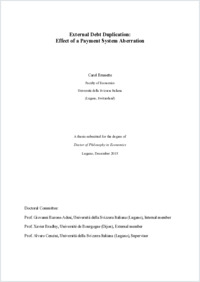External debt duplication : Effect of a payment system aberration
- Brunette, Carol
- Cencini, Alvaro (Degree supervisor)
-
03.12.2015
212 p
Thèse de doctorat: Università della Svizzera italiana, 2015
Balance of payments
External debt duplication
Global imbalances
Monetary reform
Money
Real-time gross settlement
Sovereign debt
System of international payments
English
This work examines an existing anomaly within the system of international payments and shows how it lies at the core of a duplication occurrence that adversely compounds external debt. It considers the case of the European monetary union. We explain why it would be in Member States' best economic interest, with respect to tackling their external debt and ultimately its sustainability, if efforts were concentrated first and foremost on correcting the faulty infrastructure that currently afflicts the process of international payments through lack of payment finality. We evidence how it would enable current member nations to regain their respective monetary sovereignties and thus all distinct tools of the trade essential to prosperous and sustainable growth, while simultaneously curbing their external debt. The approach advocated in this paper purports an alternative to the present status quo of trying to keep afloat a fragile monetary union despite its inherent problems and risks of irreversible negative impact. Our analysis finds strong evidence to support the fact that it is primarily this payment anomaly that perversely affects economic growth through external debt duplication, in turn responsible for fuelling and escalating a worldwide financial crisis. Finally, we bring forward the very fundamental chord responsible for undermining the European 'monetary union' in its current state - the delusion of an authentic single currency. We show how this revelation becomes undoubtedly evident when examining the procedural steps involved and currently in place at the level of international payments. Moreover we demonstrate how, in the presence of this deficient payment system, external debt duplication arises to further exacerbate the financial instability in Member States where the analysis is predominantly relevant. These countries are particularly vulnerable in their powerlessness to rectify the situation given the absence of respective monetary sovereignties that forms the basis of the Union. The ultimate implication is the inability of Member States to embark upon a path of recovery and sustainable long-term economic growth. The paradox is that, having seemingly joined the European 'monetary union' in their quest for curtailing the unfavourable effects of exchange rate volatility, Member States have become even greater victims amidst the challenging course and devastating consequences of external debt duplication. Our research deliberates the alternative of a viable and positive resolve as could be achieved under the aegis of the Schmitt School's theoretical approach - quantum monetary macroeconomics - also known as the theory of money emissions.
- Language
-
- English
- Classification
- Economics
- License
-
License undefined
- Identifiers
-
- RERO DOC 257794
- URN urn:nbn:ch:rero-006-114786
- ARK ark:/12658/srd1318591
- Persistent URL
- https://n2t.net/ark:/12658/srd1318591
Statistics
Document views: 291
File downloads:
- Texte intégral: 198
